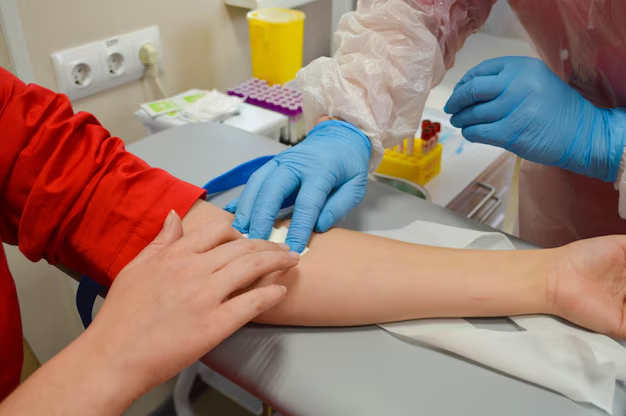Allergy & Immunology Physician: A Comprehensive Career Guide | Education, Salary, and Career Outlook
The field of healthcare is vast and primarily centered on improving and maintaining human health. Among the various specializations, Allergy & Immunology Physicians hold a vital place. These medical professionals focus on diagnosing, managing, and treating allergic conditions and disorders of the immune system, which includes asthma, allergic rhinitis, eczema, and various immunodeficiency disorders. This career path is appealing to many medical students due to its dynamic nature and the opportunity to significantly improve patients' quality of life.
Education and Training
Becoming an Allergy & Immunology Physician involves an extensive educational journey, starting from high school and extending through specialized training. Here’s a detailed look at the education and training required:
High School Preparation
For students aspiring to enter this field, focusing on science courses such as biology, chemistry, and physics during high school is crucial. Excelling in these subjects lays a solid foundation for undergraduate studies and pre-medical courses.
Required Degrees and Certifications
- Bachelor's Degree: Typically a four-year degree in a science-related field such as biology, chemistry, or biochemistry.
- Medical School: Completion of an accredited medical program, obtaining either a Doctor of Medicine (MD) or Doctor of Osteopathic Medicine (DO) degree.
- Internal Medicine or Pediatrics Residency: After medical school, a three-year residency in either internal medicine or pediatrics is necessary.
Specialized Training Programs
- Fellowship in Allergy and Immunology: This two to three-year program involves specialized training in allergy and immunology, including clinical practice and possibly research.
Licensing and Board Exams
- Medical License: Obtained by passing the United States Medical Licensing Examination (USMLE) or the Comprehensive Osteopathic Medical Licensing Examination (COMLEX-USA).
- Board Certification: Optional but prestigious, provided by the American Board of Allergy and Immunology after successfully completing the fellowship and passing the certification exam.
Continuing Education
Continuous learning is essential, with many states requiring physicians to undertake annual continuing medical education (CME) to keep their licenses active.
Education Pathway Table:
| Educational Step | Duration | Key Components |
|---|---|---|
| High School | 4 years | Focus on science courses |
| Bachelor's Degree | 4 years | Emphasis on pre-medical courses |
| Medical School | 4 years | MD or DO program |
| Residency in Internal Medicine or Pediatrics | 3 years | Hands-on clinical training |
| Fellowship in Allergy and Immunology | 2-3 years | Specialized training and research |
Skills and Qualities Needed
To excel as an Allergy & Immunology Physician, a combination of hard and soft skills is crucial.
Essential Hard Skills:
- Clinical Diagnosis: Ability to assess and diagnose immune system-related conditions.
- Treatment Management: Expertise in developing and managing treatment plans for long-term patient care.
- Research Proficiency: Skills in conducting clinical research and staying updated with the latest advancements.
Essential Soft Skills:
- Communication: Strong ability to communicate complex information effectively to patients and colleagues.
- Empathy: Sensitivity to patient needs and the emotional aspects of chronic health management.
- Problem-solving: Critical thinking to develop innovative solutions for complex health issues.
Real-World Application:
A physician might apply clinical diagnostic skills to differentiate between similar symptoms caused by allergies vs. infections. Effective communication ensures patients fully understand their condition and treatment plan, enhancing compliance and health outcomes.
Salary
Salaries for Allergy & Immunology Physicians can vary widely based on several factors.
U.S. National Averages
According to the Bureau of Labor Statistics, physicians in this field can expect an average annual salary of around $275,000.
Salary Range by Career Stage:
| Career Stage | Salary Range |
|---|---|
| Entry-level | $180,000 - $230,000 |
| Mid-career | $230,000 - $300,000 |
| Experienced | $300,000 - $400,000+ |
Factors Affecting Salary:
- Location: Salaries can be higher in urban areas with higher living costs.
- Education Level: Additional certifications and sub-specializations may enhance salary prospects.
- Practice Setting: Physicians in private practice may earn more compared to those in academic or public health settings.
Career Outlook and Job Help
Job Growth Data
The demand for Allergy & Immunology Physicians remains steady. The aging population and increasing prevalence of allergies and immune disorders contribute to ongoing job growth.
Common Employment Settings
Common employment settings for these specialists include hospitals, private clinics, academic institutions, and research facilities.
Career Advancement Opportunities
Physicians in this field may pursue leadership roles, such as medical directors or heads of departments, or engage in academic teaching and research.
Tips for Job Seekers
- Networking: Engage in local and national medical societies focused on allergy and immunology to expand professional connections.
- Resume Building: Highlight specialized training, research, and specific achievements in patient care to stand out.
- Certification Renewals: Stay current with certifications and CME requirements to enhance employability.
Final Insights
Choosing a career as an Allergy & Immunology Physician is not only intellectually stimulating but also immensely rewarding. This specialization offers the unique opportunity to make significant impacts on patients' lives by improving their everyday health and quality of life. For students passionate about science and healthcare, and who thrive on continuous learning and compassionate patient interactions, this career path is a perfect fit. With dedication and the right preparation, aspiring physicians can look forward to a fulfilling and dynamic career in this vital medical field.

